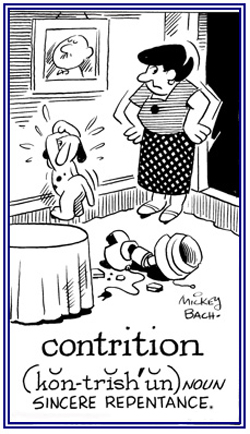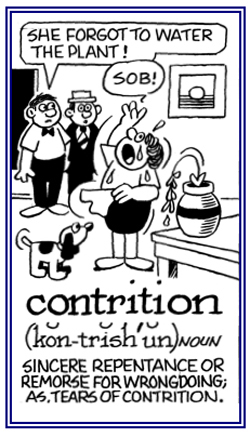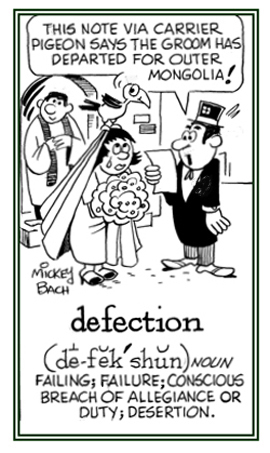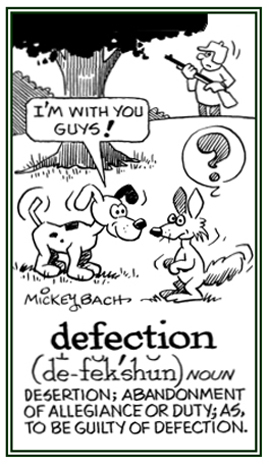-tion
(Latin: a suffix forming nouns from verbs of condition and action; an act or process: resumption, absorption; state or condition, redemption, exhaustion; something resulting from or otherwise related to an act or process, assumption, friction)
This unit is presenting a small fraction of the hundreds of words ending with the suffix of -tion; however, there is a significant number of words which may help everyone have a better understanding and appreciation of the use of this element.
2. Sorrow or affliction of mind for some fault or injury that has been done; specifically, penitence for sin: Mary's tears of contrition for neglecting her mother's birthday were sincere.
3. Etymology: from Latin terrere, "to rub"; literally, the action of rubbing things together, or against each other; grinding, pounding or bruising (so as to pulverize).


Go to this Word A Day Revisited Index
so you can see more of Mickey Bach's cartoons.
2. Etymology: from Late Latin convectio which comes from convehere, "to carry, to bring together".
2. An assembly or gathering of persons for some common object: A convention is especially a formal assembly met for deliberation or legislation on ecclesiastical, political, or social matters or other important issues.
3. The manner in which something is normal done; custom; tradition: Jack and Jill decided to skip the convention of having a Christmas tree and of giving each other presents for Christmas, but instead just have a fancy candlelight dinner!
2. A firmness of an opinion; such as, something that is said with complete certainty or confidence: Mrs. Smith had a strong conviction that all of the people around the world should have the freedom of speech.
3. An act of finding someone guilty of a crime: The evidence pointed out that a conviction was certain because of Tim's drunk-driving when he was going home after being at the pub.
4. The act or process of persuading or the state of being convinced: The teachers of the school all shared a strong conviction that the principal should call a meeting to discuss and to solve the problems of so many refugees coming to their school all of a sudden.

Go to this Word A Day Revisited Index
so you can see more of Mickey Bach's cartoons.
2. An alteration that rectifies a flaw or error: Jim read the improvements, or corrections, that his teacher, Mr. Jackson, made on his homework.
2. Etymology: from Latin correptio, then from corripere, "to seize".
2. The state of being corrupt.
3. Decay; rot.
4. Etymologically the word "corruption" comes from the Latin verb corruptus "to break"; past participle of corrumpere "to destroy" [com-, "together with", intensive prefix + rumpere, "to break"].
Conceptually, corruption is a form of behavior, which departs from ethics, morality, tradition, law, and civic virtue.
Extended definitions and examples
- Lack of integrity or honesty (especially susceptibility to bribery); use of a position of trust for dishonest gain [syn: corruptness] [ant: incorruptness].
- In a state of progressive putrefaction [syn: putrescence, putridness, rottenness].
- Decay of matter; as by rot or oxidation.
- Moral perversion; impairment of virtue and moral principles: "the luxury and corruption among the upper classes"; "moral degeneracy followed intellectual degeneration"; "its brothels; its opium parlors; its depravity" [syn: degeneracy, depravity].
- Destroying someone's (or some group's) honesty or loyalty; undermining moral integrity: "corruption of a minor"; "the big city's subversion of rural innocence" [syn: subversion].
- Inducement (as of a public official) by improper means (as bribery) to violate duty (as by committing a felony): "He was held on charges of corruption and racketeering."
2. The fact or state of having been created; such as, an artifact that has been brought into existence by someone.
3. The act of investing with a new office or title; the act of starting something for the first time; introducing something new.
4. The world and all things in it; everything that exists anywhere.
5. All creatures or a class of creatures.
4. According to the Bible, the act of God that brought the universe and all living beings into existence.
The divine act by which, according to various religious and philosophical traditions, the world was brought into existence.
2. The action of burning or cremating; specifically, the reduction of a corpse to ashes as a way of disposing of it in lieu of interment; an instance of this practice.
The psychic viewpoint regarding cremation
Cremation is the process of using fire to burn the corpse shortly after death to purify the atoms of the physical body from the dross negative thoughts impinged within.
Cremation frees the soul-mind more quickly from the magnetic pull of the bone and cell structure to allow the soul-mind to go about its new tasks in the etheric world (invisible space containing many kinds of life forms and many levels of intelligences, all of which are communicating psychiacally with mankind).
Cremation hastens the reduction of material elements of the physical body to the primal elements again.
2. The process of deducing or drawing a conclusion from a principle already known or assumed; specifically, in logic, inference by reasoning from generals to particulars; opposed to induction.
3. That which is deduced; an inference, conclusion.
2. A failure in completing one's objective: Suddenly Tim was overwhelmed by a sudden defection of courage to swim across the English Channel.




